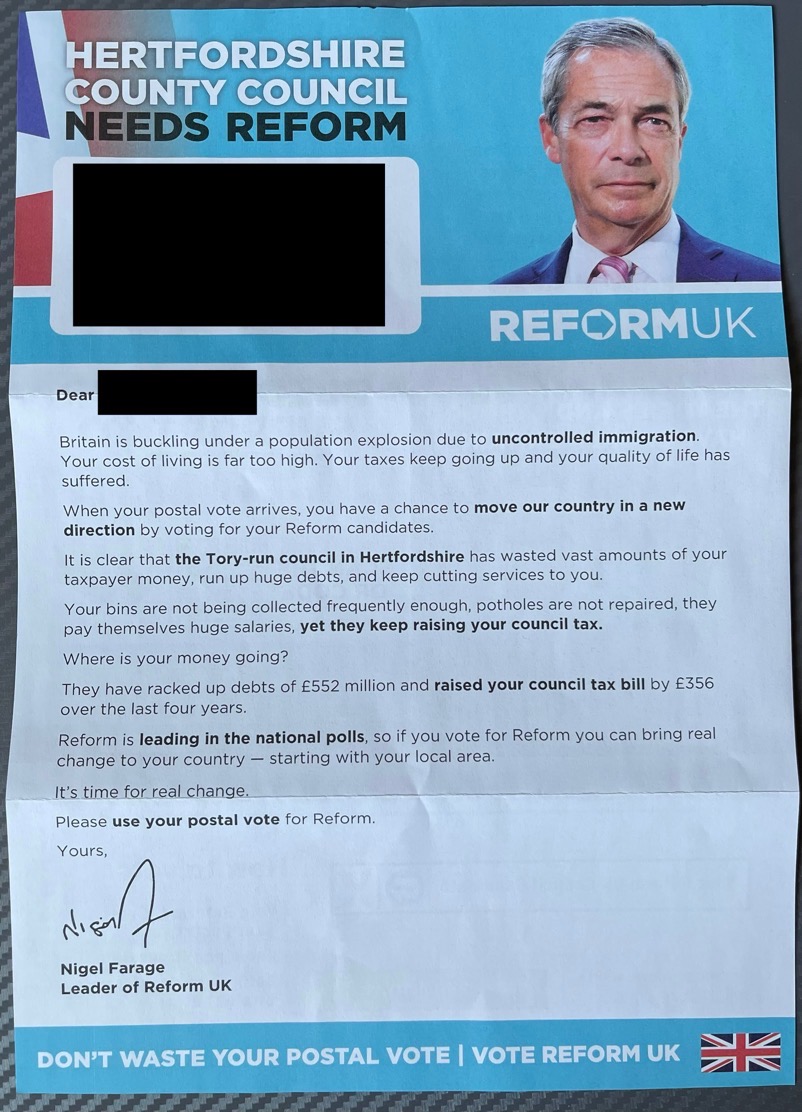
Read our Monthly Magazine
And support our mission to provide fearless stories about and outside the media system
Reform candidates in one of the party’s newly claimed councils exploited a legal loophole allowing them to send out mass mailouts to voters from Nigel Farage, which did not count towards local election spending limits.
At least a dozen Reform UK councillors elected in May did not declare costs for two direct mail campaigns from their party leader, expenses records analysed by Byline Times suggest – despite the Reform leader talking about Durham County Council and its handling of taxpayer funds.
At least two mass mailings from Reform UK leader Nigel Farage went out to residents ahead of May’s local elections, which explicitly mention Durham County Council. Reform won control of the council, one of 12 areas now in their hands.
This outlet has obtained electoral expense declarations from Durham County Council for newly elected Reform UK councillors.
Failure to declare election spending would constitute an offence under the Representation of the People Act. The Act requires declaration of any expenses “used for the purposes of the candidate’s election” including free services or facilities.
Don’t miss a story
If the leaflets had counted towards local spending limits, in most cases analysed the maximum threshold would have been breached, and the votes would likely have to be re-run.
However, it appears that the mailouts do not legally have to be declared locally due to a legal loophole which excludes communications that do not specifically mention the candidates’ names. Transparency campaigners at Spotlight on Corruption say this is a ‘glaring loophole’ in the rules, which are designed to create a level playing field.
Several other areas received similar locally-facing leaflets from Nigel Farage ahead of the local elections, including Devon, Shropshire, Cambridgeshire, Hertfordshire, and Staffordshire. Reform won control of Staffordshire.
The posted mailouts ahead of May from Reform leader Nigel Farage sent to Durham residents attacked the then-Lib Dem coalition administration. The posted letter states: “Your local council in Durham has wasted vast amounts of your taxpayer money…
“They have racked up debts of £409m and raised your council tax bill by £461 over the last four years.”
All of the 12 Reform councillors’ spending returns analysed would have been pushed over the legal spending limit, had they been made to declare the Durham-facing leaflets from Nigel Farage sent by Reform HQ.
Tim Picton, Senior Advocacy Advisor at Spotlight on Corruption, told Byline Times the findings “underlines yet again the importance of robust campaign finance rules.”
“Campaign spending limits exist for important reasons. There is a golden opportunity in the [Government’s] upcoming Elections Bill to close this glaring loophole and level the playing field when it comes to local election spending.”
“Otherwise, it will continue to be exploited by larger parties, such as Reform UK, who have significant resources to back their local candidates, unlike independent candidates or those representing smaller parties.”
Spotlight on Corruption is now calling on the Government to give the Electoral Commission the responsibility to centrally publish local election expenses to improve transparency and enable greater public scrutiny.
Deputy leader Darren Grimes’ expenses include £850 for a promotional video by an unexpected videographer, “moody/arty” Turkish-Scottish music artist Sel MacLean. But, like the others analysed, Nigel Farage’s two Durham-focused letters to local residents were not declared. There is no suggestion of rule-breaking.

Opposition figures suggest “very considerable undeclared funds” may have been pumped into Reform’s local election campaigns. But the Electoral Commission suggests no rules have been broken.
It is possible that similar practices occurred in many of the other 11 council areas where Reform won control in May.
The Electoral Commission guidance on the law states: “Where [campaign] material is distributed across a number of electoral areas [such as a council], you will need to apportion the costs of the activity.”
But a spokesperson for the Commission told Byline Times the leaflet was unlikely to be in breach of election law, due to what appears to be a legal loophole.
The spokesperson said: “For local government elections, any spending by candidates, or by a party or non-party campaigner on behalf of a candidate, falls under candidate spending rules. This includes instances where the material identifies the specific electoral area in which the candidate is standing.
“For council elections, the electoral area refers to specific wards, or electoral divisions within unitary and county councils, as applicable. Identifying the county council without clearly promoting a candidate, would not be considered candidate spend[ing].
ENJOYING THIS ARTICLE? HELP US TO PRODUCE MORE
Receive the monthly Byline Times newspaper and help to support fearless, independent journalism that breaks stories, shapes the agenda and holds power to account.
We’re not funded by a billionaire oligarch or an offshore hedge-fund. We rely on our readers to fund our journalism. If you like what we do, please subscribe.
Details of a candidate’s spending and donations must be reported to the local Returning Officer following the election. These returns are available for public inspection on request from the local authorities, who retain copies for two years. The police are responsible for the enforcement of controls on candidate spending.
In what is often seen as a transparency failing, local election expenses are rarely published online and are not held centrally by the Electoral Commission, instead being handled by England’s 300+ local councils.
Reform UK and Durham Council’s Reform leader were contacted for comment.
holding farage to account #reformUNCOVERED
While most the rest of the media seems to happy to give the handful of Reform MPs undue prominence, Byline Times is committed to tracking the activities of Nigel Farage’s party when actually in power
Got a story? Get in touch in confidence on josiah@bylinetimes.com







